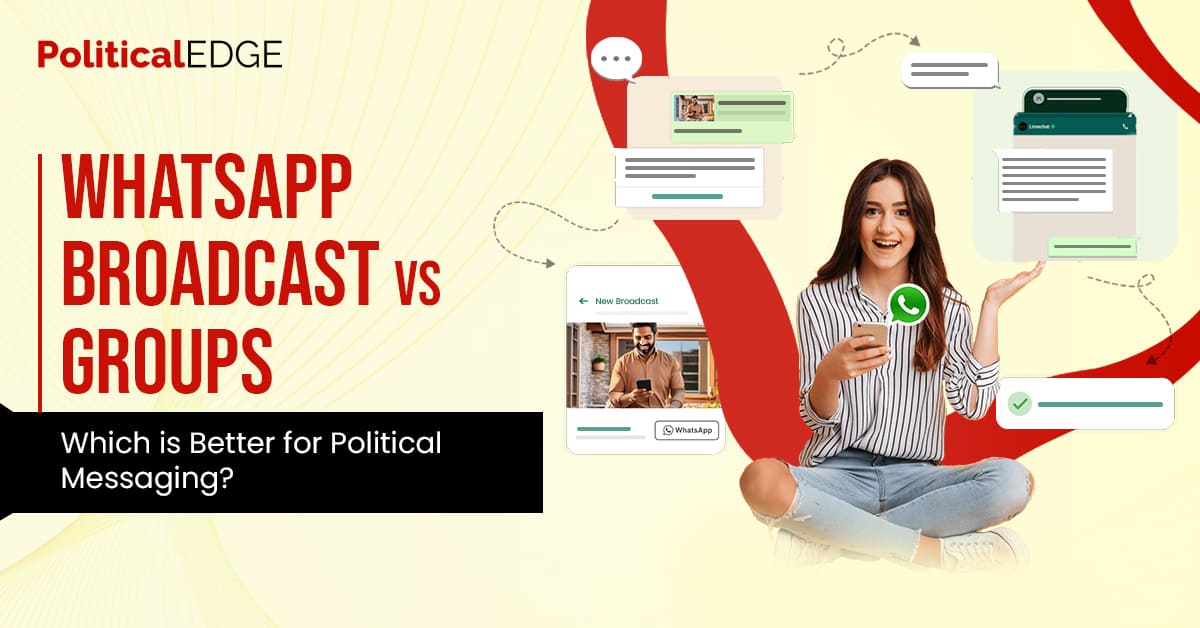
WhatsApp Broadcast vs. Groups: Which is Better for Political Messaging?
In today’s world of political communication, reaching the people with the right message at the right time has become very necessary for any political campaign. Political messaging basically refers to non-verbal communication that shapes the political strategy of any political party or leader.
Among many social media platforms, WhatsApp has become a powerful medium for enhanced political reach, as it is used by most people nowadays for daily communication, especially in India. The country has the largest number of WhatsApp users with approximately 535.8 million people. https://wanotifier.com/WhatsApp-statistics
When it comes to clear communication, political parties often find themselves in a difficult position. There is always a question that pops up about whether a WhatsApp group or broadcast channel would be best for the reach of political campaigns, volunteer coordination, and voter engagement.
The following blog will discuss both WhatsApp broadcast and group in detail: Which one is best for political messaging?
Let’s start by identifying the pros and cons of each.
Pros and Cons Of WhatsApp Broadcast For Political Messaging:
Pros:
- Privacy And Personalization: Broadcast is one of the direct and personalised means of communication with voters, where messages can be shared personally with individuals, without others seeing contact details of the fellow group members.
- When messages are sent personally voters are more likely to read and engage with that, unlike mass-sent where people mostly get distracted among other irrelevant messages.
- No Interruptions: In broadcast messages, there are no off-topic discussions, shared jokes, or irrelevant replies to distract voters from the main topic, as the messages are only delivered to individual voters.
- This clear and focused delivery of the main message ensures that your political communication stays clear, professional, and impactful.
- Easy To Manage: WhatsApp broadcast is simple to handle and stress-free too. Here people can’t send messages and ask off-topic questions, saving your time and keeping the conversation on track.
- Broadcast list is an effective tool for mass communication on WhatsApp. This is a saved list that allows political parties and candidates to message multiple voters at once (up to 256 contacts). Moreover, this list is also helpful for long-term political success.
Cons:
- Limited Community Engagement: As WhatsApp broadcast is associated with privacy and personal communication, this makes it harder for the political leaders to create a sense of community and teamwork, leading to limited interaction.
- Lack Of Two-Way Communication: In WhatsApp broadcasts, voters can’t give instant feedback or express their opinions on a specific topic.
- Limits The Reach-: Only users who have saved your number will receive your messages.
Pros and Cons Of WhatsApp Groups For Political Messaging:
Pros
- Two-Way Communication: In this voters are engaged in discussion which not only increases public interest but also creates a sense of loyalty and support for the party, proving it beneficial for sustainable politics.
- Social Influence: In group discussions people support and influence each other through shared enthusiasm, giving every member a chance to connect with the party and the leaders.
- Speedy Response: WhatsApp groups are the most effective platform on social media where messages spread fast. Through WhatsApp groups, urgent messages like last-minute events, rally announcements, and volunteer coordination can spread instantly with maximum participation. Moreover, it also increases the chance of candidates winning elections by encouraging greater public engagement and active participation.
Cons:
- Create Interruptions: WhatsApp groups consist of no. of participants often leading to different opinions, off-topic discussions, and even disagreements on some topics which may divert attention from the main message.
- Privacy Concerns: Members of groups can see each other’s phone numbers and can call or message them, which creates problems. In some cases, it even leads to the misuse of personal information, harming the trust of the political leader and reducing the engagement of voters in sustainable politics.
- Misinformation Spread: Through WhatsApp groups fake news or rumors can spread instantly, which creates a poor perception of the political leader or party among the voters.
How To Use WhatsApp Effectively For Political Messaging?
WhatsApp can be a powerful tool for political outreach when used strategically; however, WhatsApp Groups and broadcast channels each come with their own advantages and disadvantages, catering to different aspects of political communication. To make this clear here are some below-mentioned objectives that will help us to understand the right use of WhatsApp for the purpose of maximum political engagement:
| Objective | Best Opinion |
|---|---|
| Encouraging Debate/Discussions | Group |
| Sharing sensitive Information | Broadcast |
| Building Supporter Community | Group |
| Promoting Local Events | Broadcast |
Conclusion
In modern democracy, where communication is instant, no message is too small to make an impact. Both WhatsApp broadcasts and groups provide unique advantages for political communication. By understanding the strengths and limitations of each, political parties and leaders can use them strategically to expand their reach, engage voters effectively, and improve their chances of winning elections.
Moreover, Political Edge, is a political consulting firm in India that provides not just data-driven strategies but also innovative political campaigns that makes any political leader stand out. Ultimately, effective communication not only lies in technology but also in strategy and understanding the audience.
Thus, for effective political campaigns and strategies political leaders and candidates can reach out to Political Edge for maximum voter engagement and enhanced chances of winning elections.

